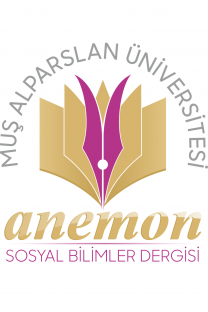Eleştirel Pedagoji İlkelerine Göre Yapılan Fen Öğretiminin Öğrencilerin Akademik Başarılarına Etkisi
The Impact of Science Teaching Based on Critical Pedagogical Principles on Academic Achievement of Students
___
- Althusser (1991). İdeoloji ve Devletin İdeolojik Aygıtları. İstanbul: İttihaki Yayınları.
- Anderson, R. (1998). Why talk about different ways to grade? The shift from traditional assessment to alternative assessment. New Directions for Theaching and learning, 74, 5-15.
- Arslan, M. M., & Eraslan, L. (2003). Yeni eğitim paradigması ve Türk eğitim sisteminde dönüşüm gerekliliği. Milli Eğitim Dergisi, 160(2).
- Ball, S. J. (2007). Educationplc:Understanding private sector participation in publicsector education. London and New York: Routledge.
- Beane, J. (2005). A reason to Teach: Creating Classrooms of Dignity and Hope. Postmouth, NH: Heinemann.
- Chomsky, N. (2007). Chomsky, Demokrasi ve Eğitim. (Çev. E. Abaoğlu). İstanbul: BGST Yayınları.
- Creswell, J. W. (2013). Research design: Qualitative, quantitative, and mixed methods approaches. Sage publications.
- Diaz, M. (2016). Critical pedagogy and student success: The transformative work of teaching and learning. Doctoral Dissertation. New Mexico State University.
- Emir, S. (2012). Eğitim Fakültesi Öğrencilerinin Eleştirel Düşünme Eğilimleri. Hasan Ali Yücel Eğitim Fakültesi Dergisi, 17, 34-57.
- Ercan, F. (1998). Eğitim ve Kapitalizm: Neo- Liberal Eğitim Ekonomisinin Eleştirisi. İstanbul: Bilim.
- Ercan, F., & Uzunyayla, F. (2009). A Class Perspective on the New Actors and Their Demands from the Turkish Education System. New York: Routledge.
- Ertürk, S. (1972). Eğitimde Program Geliştirme. Ankara: Yelkentepe Yayınları.
- Field, A. (2009). Discovering statistics using SPSS. Sage Publications.
- Fischman, G.E., & Mclaren, P. (2005). Rethinking Critical Pedagogy and the Gramscian and Freirean Legacies: From Organic to Committed Intellectuals or Critical Pedagogy, Commitment, and Praxis.Cultural Studies- Critical Methodologies, 5(4), 425-447.
- Freire, P. (2006). Ezilenlerin Pedagojisi. (Çev. Dilek Hattatoğlu, Erol Özbek). İstanbul: Ayrıntı Yayınları.
- Freire, P. (2009). Dönüşümün Riskleri ve Hissettirdiği Korkular. Eleştirel Pedagoji Söyleşileri. (Çev. E.Ç. Babaoğlu). İstanbul: Kalkedon Yayınları.
- Giroux, H. A. (1979). Paulo Freire’s Approach to Radical Educational Reform. Curriculum Inguiry, 9(3), 257-272.
- Giroux, H. A. (2007). Eleştirel Pedagoji ve Neoliberalizm. İstanbul: Kalkedon.
- Giroux, H. A. (2009). Dil/Kültürel İncelemeler Alanında Eleştirel Pedagojinin Bir Rolü Varmıdır? Eleştirel Pedagoji Söyleşileri. (Çev. E.Ç. Babaoğlu). İstanbul: Kalkedon Yayınları.
- Gliner, J. A., Morgan, G. A., & Leech, N. L. (2011). Research methods in applied settings: An integrated approach to design and analysis. Routledge.
- Ho, R. (2006). Handbook of univariate and multivariate data analysis and interpretation with SPSS. CRC Press.
- Kesik, F., & Bayram, A. (2015). Eğitim Sisteminin Eleştirel Pedagoji Perspektifinden Bir Değerlendirilmesi. Mersin Üniversitesi Eğitim Fakültesi Dergisi, 11(3), 900-921.
- Kıyıcı, F. B., & Aydoğdu, M. (2011). Fen Bilgisi Öğretmen Adaylarının Günlük Yaşamları İle Bilimsel Bilgileri İlişkilendirebilme Düzeylerinin Belirlenmesi. Necatibey Eğitim Fakültesi Elektronik Fen ve Matematik Eğitimi Dergisi, 5(1).
- McLaren, P. (1993). Schooling As a Ritual Performance: Towards a Political Economy of Educational Symbols and Gestures. New York: Routledge.
- McLaren, P. (2011). Okullarda Yaşam. Eleştirel Pedagojiye Giriş. Ankara: Anı Yayıncılık.
- McLaren, P. L. (2003). Revulationary Pedagogy in Post Revolution Times. Rethinking the Political Economy of Criritical Education. NY: Routledge Falmer.
- Miles, M. B. & Huberman, A. M. (1994). Qualitative data analysis: A sourcebook. Beverly Hills: Sage Publications.
- Neukom, J. R. (2000). Alternative Assessment: Rubrics Sdunets Self Assessment Process. Master Thesis. The Faculty of Pasific. Lutheran Universty, U.S.A.
- Oakes, J. (2005). Keeping Track: How Schools Structure Inequality. New Haven, CT: Yale Universty Press.Oakes, J. (2005). Keeping Track: How Schools Structure Inequality. New Haven, CT: Yale Universty Press.
- Öngel, Ü (2003). Şekerli Eğitim: Davranışçılığın Eğitim Uygulamalarındaki Sakıncaları ve Alternatif Modeler. İçinde: XII Eğitim Bilimleri Kongre Kitapçığı. Ankara: Gazi Üniversitesi Yayınları.
- Patton, M. Q. (1990). Qualitative evaluation and research methods. SAGE Publications.
- Roach, A. T., Elliot, S. N & Bernotl, S. (2007). Theacher perceptions and the consequential validity of an alternate assessment for students with significant cognitive. Journal of Disability Policy Studies, 18, 168-175.
- Rogers, R., Mosley, M., & Folkes, A. (2009). Focus on policy: Standing up to neoliberalism through critical literacy education. Language Arts, 87(2), 127-138.
- Rubenson, K. (2009). Lifelong Learning: Between Humanism and Global Capitalism. London New York: Routledge.
- Sağıroğlu, N. A. (2008). Özgürleştirici Bir Eğitim Arayışı: Eleştirel Pedagoji Okulu I. Eğitim Bilim Toplum Dergisi, 6(24), 50-51.
- Sağıroğlu, N. A. (2013). Özgürleştirici Eğitim Arayışları: Köy Enstitüleri ve Eleştirel Pedagoji Okulu. Amme İdaresi Dergisi, 46(1), 81-98.
- Yıldırım, A., & Şimşek, H. (2008). Sosyal Bilimlerde Nitel Araştırma Yöntemleri. Ankara: Seçkin Yayıncılık.
- Yılmaz, K., & Altınkurt, A. (2011). Öğretmen Adaylarının Eleştirel Pedagoji İle ilgili Görüşleri. Ahi Evran Üniversitesi Eğitim Fakültesi Dergisi, 12(3), 195-213.
- Yayın Aralığı: Yılda 3 Sayı
- Başlangıç: 2013
- Yayıncı: Muş Alparslan Üniversitesi
Daha Demokratik Bir Yönetimin İnşasında Açık Hükümet Uygulamasının Kullanılması: İsveç Örneği
Nüfusun ve Yerleşmelerin Yükseltiye Göre Değişimi: Muş İli Örneği
Muazzez HARUNOĞULLARI, İskender DÖLEK, Vedat AVCI
Tehlikeli Madde Taşımacılığı Güzergâh Seçimi Problemi İçin Stokastik Bir Risk Analizi
Genç Yetişkinlerde Mutluluğun Özgünlük ve Kişisel Erdemler Açısından İncelenmesi
Anadolu Lisesi Öğretmenlerinin Tükenmişlik Düzeylerinin Çeşitli Değişkenlerle İlişkisi
İslam’a Göre Çocuğun Eğitilecek Yönleri
Giyilebilir Teknolojilerin Sağlık Hizmetlerine ve Sağlık Hizmet Kullanıcılarına Etkileri
Abdurrahîm Rahmî Hekkarî ve Dersa Dîn İsimli Eseri Üzerine Bir İnceleme
Öz-Yeterlik Algısı ve Örgütsel Sinizm İlişkisi: Algılanan Yönetici Desteğinin Aracılık Rolü
